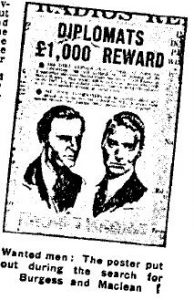
This month sees the launch of a new Routledge book series – jointly edited by Dr Nicholas Barnett, Lecturer in Twentieth Century History at Plymouth University and Dr Laura Crossley, Lecturer in Film at Bournemouth University – that aims to generate new insights into the connections between espionage and culture.
During the second half of the twentieth century the public became aware of the importance of the role of espionage and security services. Television, radio and print news reported shocking events including the defection of Soviet moles like Kim Philby, Guy Burgess and Donald McLean; the Profumo scandal of 1963 that exploded when the British Secretary of State for War, John Profumo, had an affair with a woman who was in contact with the Soviet security services; and the state censorship of Peter Wright’s memoir Spycatcher (1987).
Whilst the news sparked the public interest, popular culture soon followed and the 1950s and 60s saw the resurgence of spy books, films and television series. The James Bond franchise of books and films began in 1953 with the publication of the book Casino Royal. Bond achieved mass popularity in 1962 with the cinematic release of Dr No.
Over the coming decades twelve authors have written James Bond novels or shorts stories and he has been played by seven actors with the books and films enjoyed by millions. Other authors such as John le Carré and Len Deighton released bestsellers which were adapted for film and television and brought an often more realistic version of spying to an international public.

These news stories have seen the emergence of new espionage culture. The James Bond series remains as popular as ever. Le Carré’s Tinker Tailor, Soldier, Spy was remade in 2011. And in BBC’s The Game (2014) and FX’s The Americans (2013), the link to the Cold War remains close to the public association with espionage culture. This link has generated nostalgia for the Cold War with many people perceiving the era as relatively safe with the intelligence game making the world more secure than it is today with the asymmetric terrorist threat.
The spy genre has also evolved and series like Homeland from 2011, the BBC’s Spooks and Channel 4’s recent reality-television series Spies (2017) have given viewers an inside view on the nature of modern espionage. Spy scandals and spy culture continue to play a key part in news and entertainment and capture the public imagination
‘Routledge Studies in Espionage and Culture’ is a major new book series, which seeks to investigate representations of the intelligence world and how we interact with it.
The scope of the series is international and it seeks to blend several disciplines including cultural studies, history, literature and film studies. Books published in the series will investigate topics including: the spy novel, films, television shows, documentaries, games, music, fashion and materiality. Whilst books on the representation of intelligence agencies in popular culture are welcome the editors also welcome contributions which investigate political cultures and the everyday lives within the organisations themselves as well as wider considerations of surveillance culture.
Scholars have long been interested in the representation of spies and spying and this series seeks to establish itself as one of the key outlets for continuing that scholarly conversation. Where possible the monographs and collections of essays will be include comparative international studies but submissions will also be welcomed which examine significant national cultures.
The series does not seek to limit itself to any particular time period and will publish accounts of both historic and contemporary espionage and culture. Each book will feature a unique introduction written by the series editors.
For details on how to propose a book for Routledge Studies in Espionage and Culture please contact Nick Barnett nicholas.barnett@plymouth.ac.uk or Laura Crossley lcrossley@bournemouth.ac.uk

